#buy agricultural tools
Explore tagged Tumblr posts
Text

Top Agricultural Tools for Small-scale Farming | Farming Tips | Tata Agrico
If you have a small farm, here’s the agricultural tools you need to cultivate and harvest your land. Read on to know more. https://bit.ly/49rmUIt
#farming tips#agricultural tools#buy agricultural tools#agricultural tools online#agricultural tools price#farming tools#farming tools online#farming tools price
0 notes
Text
#Online shop#buy#Machinerydukaan#buy online#shopping center online#tools online shopping#agriculture#wholesale#supplier#dealership#sale#offer#tools#machinery#types of equipment#Delhi#India#Power Weeder#Power Sprayer Machinerydukaan
1 note
·
View note
Text
Tractor Trailer Prices in India | Best Trailer Machine

Fieldking offers a wide range of tractor trailers in India. Trailers are used in different industries, like farming and construction. They can carry all kinds of things, from raw materials to finished products. Think of them as big helpers in moving stuff from one place to another.
There are different types and sizes of trailers, each designed for specific jobs, making them super useful in many industries.
#tractor trailer for sale#buy tractor trailer#tractor trailers#tractor trailer#agricultural machinery#farming tools#farm equipment#farm implements
0 notes
Text
🛑 Stop 🛑‼️🙏
Hello all I am Doaa Jad Al Haq from Gaza I studied a diploma in fashion design and clothing manufacturing at the Palestine Technical College in Deir al-Balah and graduated with a very good grade. I was first in my class during the two years. I worked for a year in a center affiliated with UNRWA, and after that I created my own project and began Palestinian agricultural hand embroidery, which is part of the Palestinian heritage. I embroidered on clothes and bags, then After that, I focused more on making bags in all their forms. I embroidered the bag with different drawings, shapes, and colors, then I completely detailed it. I had my own workshop. Unfortunately, everything was gone from the beginning of October 7, so the occupation destroyed the place where I was working, and by destroying my house, I had nothing left, and during the last four months, I borrowed money from a friend to leave Gaza with my autistic child. The situation was very bad for him and for all of us. I left behind my husband and my family. Now, with your help and generosity, I hope that you will help me buy a machine and the necessary tools to start my project again in Egypt so that I can treat my child and help my family. I trust your generosity and I am sorry to ask you for this. Your donation, no matter how simple, will contribute to starting a new life. Thank you all. Best regards, Doaa"
Link to verification (same gofundme)
https://gofund.me/9e4024a3







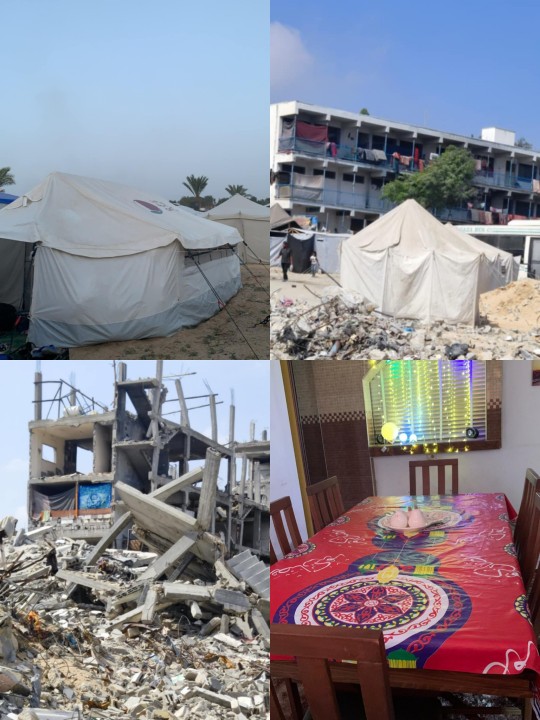

@nabulsi @sar-soor @appsa @akajustmerry
@annoyingloudmicrowavecultist @feluka
@tortiefrancis @flower-tea-fairies @tsaricides
@riding-with-the-wild-hunt @vivisection-gf
@belleandsaintsebastian @ear-motif @ibtisams
@animentality @kordeliiius
@communistchilchuck @brutaliakhoa @raelyn-dreams
@troythecatfish @the-bastard-king @tamarrud
@4ft10tvlandfangirl @queerstudiesnatural
@northgazaupdates @90-ghost @skatehani
@awetistic-things @gentl3manly @baby-girl-aaron-dessner
@morallyrainyday
@troythecatfish @loonarmuunar @dendrosys
@stil-lindigo
4K notes
·
View notes
Text
#buy gardening tools online#buy gardening tools online in India#buy gardening tools#gardening tools#agriculture technology#badikhetiindia#agritech
0 notes
Text
Best Marketplace to Buy Agricultural Products Georgia- Farmers Plus
Looking for the Best Marketplace to Buy Agricultural Products in Georgia? Farmers Plus is the only place to go for all of your agricultural needs on Georgia's top online platform. A broad selection of top-quality, farm-fresh foods, livestock, and agricultural essentials are readily available from nearby farmers. We promise a simple shopping process with a streamlined user interface and secure payment options. The highest standards of freshness and authenticity are guaranteed at this market because it places a high priority on sustainability and helps local farmers. Whether you're a savvy consumer or a committed farmer, we offer a unique opportunity to engage with, collaborate with, and grow within Georgia's vibrant agricultural community. Go to the best marketplace for incredible farming.
#Crop Management Tools#Buy Agricultural Products Online New York#Online Marketplace for Farmers#Farm Management Features
1 note
·
View note
Note
I'm asking this genuinely, as a 19 yo with no education in economics and a pretty surface level understanding of socialism: can you explain the whole Bananas discourse in a way someone like me might understand? In my understanding it's just "This is just a product we can give up to create better worker conditions and that's fine" but apparently that's not the full picture?
alright so some pretty important background to all this is that we're all talking about the fact that bananas, grown in the global south, are available year-round at extremely low prices all around europe and the USA. it's not really about bananas per so--the banana in this discourse is a synechdoche for all the economic benefits of imperialism.
so how are cheap bananas a result of imperialism? first of all i want to tackle a common and v. silly counterargument: 'oh, these ridiculous communists think it's imperialist for produce to be shipped internationally'. nah. believing that this is the communist objection requires believing in a deeply naive view of international traide. this view goes something like 'well, if honduras has lots of bananas, and people in the usa want bananas and are willing to pay for them, surely everyone wins when the usa buys bananas!'.
there are of course two key errors here and they are both packed into 'honduras has lots of bananas'. for a start, although the bananas are grown in honduras, honduras doesn't really 'have' them, because the plantations are mostly owned by chiquita (formerly known as united fruit) dole, del monte, and other multinationals--when they're not, those multinationals will usually purchase the bananas from honduran growers and conduct the export themselves. and wouldn't you know it, it's those intervening middleman steps--export, import, and retail, where the vast majority of money is made off bananas! so in the process of a banana making its way from honduras to a 7/11, usamerican multinationals make money selling the bananas to usamerican importers who make money selling them to usamerican retailers who make money selling them to usamerican customers.
when chiquita sells a banana to be sold in walmart, a magic trick is being performed: a banana is disappearing from honduras, and yet somehow an american company is paying a second american company for it! this is economic imperialism, the usamerican multinational extracting resources from a nation while simultaneously pocketing the value of those resources.
why does the honduran government allow this? if selling bananas is such a bad deal for the nation, why do they continue to export millions of dollars of banans a year? well, obviously, there's the fact that if they didn't, they would face a coup. the united states is more than willing to intervene and cause mass death and war to protect the profits of its multinationals. but the second, more subtle thing keeping honduras bound to this ridiculously unbalanced relationship is the need for dollars. because the US dollar is the global reserve currency, and the de facto currency of international trade, exporting to the USA is a basic necessity for nations like honduras, guatemala, &c. why is the dollar the global reserve currency? because of usamerican military and economic hegemony, of course. imperialism built upon imperialism!
this is unequal exchange, the neoimperialist terms of international trade that make the 'global economy' a tool of siphoning value and resources from the global south to the imperial core. & this is the second flaw to unravel in 'honduras has a lot of bananas' -- honduras only 'has a lot of bananas' because this global economic hegemony has led to vast unsustainable monoculture banana plantations to dominate the agriculture of honduras. it's long-attested how monoculture growth is unsustainable because it destroys soil and leads to easily-wiped-out-by-infection plants.
so, bananas in the USA are cheap because:
the workers that grow them are barely paid, mistreated, prevented from unionizing, and sometimes murdered
the nations in which the bananas are grown accept brutally unfair trade and tariff terms with the USA because they desperately need a supply of US dollars and so have little position to negotiate
shipping is also much cheaper than it should be because sailors are chronically underpaid and often not paid at all or forced to pay to work (!)
bananas are cheap, in conclusion, because they're produced by underpaid and brutalized workers and then imported on extortionate and unfair terms.
so what, should we all give up bananas? no, and it's a sign of total lack of understanding of socialism as a global movement that all the pearl-clutching usamericans have latched onto the scary communists telling them to stop buying bananas. communism does not care about you as a consumer. individual consumptive choices are not a meaningful arena of political action. the socialist position is not "if there was a socialist reovlution in the usa, we would all stop eating bananas like good little boys", but rather, "if there's a socialist revolution in the countries where bananas are grown, then the availability of bananas in the usa is going to drop, and if you want to be an anti-imperialist in the imperial core you have to accept that".
(this is where the second argument i see about this, 'oh what are you catholic you want me to eat dirt like a monk?' reveals itself as a silly fucking solipsistic misunderstanding)
and again, let's note that the case of the banana can very easily be generalised out to coffee, chocolate, sugar, etc, and that it's not about individual consumptive habits, but about global economic systems. if you are donkey fucking kong and you eat 100 bananas a day i don't care and neither does anyone else. it's about trying to illustrate just one tiny mundane way in which economic imperialism makes the lives of people in the global north more convenient and simpler and so of course there is enormous pushback from people who attach moral value to this and therefore feel like the mean commies are personally calling them evil for eating a nutella or whatever which is frankly pretty tiring. Sad!
tldr: it is not imperialism when produce go on boat but it is imperialism when produce grown for dirt cheap by underpaid workers in a country with a devalued currency is then bought and exported and sold by usamerican companies creating huge amounts of economic value of which the nation in which the banana was grown, let alone the people who actually fucking grew it, don't see a cent -- and this is the engine behind the cheap, available-every-day-all-year-everywhere presence of bananas in the usa (and other places!)
14K notes
·
View notes
Text
ASTROLOGY OBSERVATIONS
Check out my paid readings, i do astrology as well as tarot!!!
Buy me a coffee!!
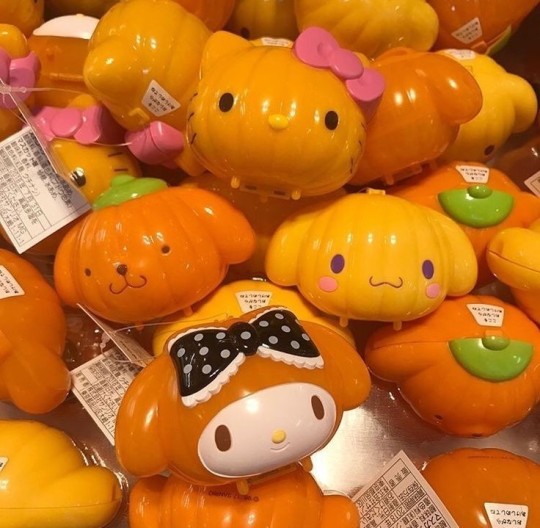
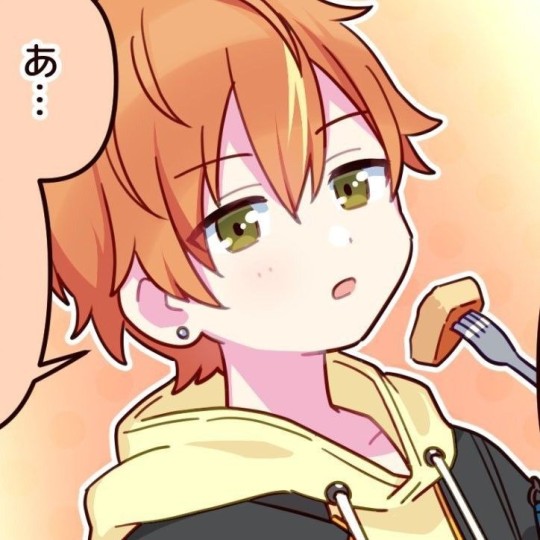

- the thing that people with prominent rahu placements have to face is SHAME it can be of anything social, financial, family wise etc anything but shame is one thing that is very engraved in them since birth for something and they might lie alot to hide it.
- people with mars in their 6h should be careful with machines, pointed things, fire and agriculture tools etc
- saturn in 12h makes it hard for people to fall asleep
- I recently read somewhere that Islam is ruled by Scorpio and Hinduism by cancer and it makes SO MUCH sense if you can think about it
-> Islam obviously being a religion whose people are very dedicated to it, very loyal believers etc for hinduism the importance that it gives to women especially mothers, milk etc
-> look at your 12h to understand how your birth must have been like for your mother for example someone who has capricorn in their 12h their mother might have had them after alot of pain or suffering considering that capricorn is hadwork and is rules by Saturn itself
-> people with Venus in their 12h might see their lovers in their dreams way before they might actually meet them
-> good and prominent rahu placements indicate being good in business, stalks and social media but one must take care as rahu is also illusion and addiction
-> look at your 8h and 12h, the signs and planets that you have their will show you the kind of people you don't vibe with
-> the 8h sign would mean that you might go through alot with people of this sign or alot of your transformational knowledge might come after getting out of some bond with this person whereas your 12h sign might represent the people that you absolutely cannot stand and feel like they can't stand you either. You might not even realise why they have some sort of power over you but they do
-> Gemini placements have a very hard time being formal for which alot of times people might find them disrespectful (mainly earth placements lmao)
-> if you are feeling creatively blocked try to look at your 5h to see what to do
-> people with Jupiter in their 8h have alot of hidden knowledge that people might not think that they have and people with Jupiter in their 8h might just not be aware of it lmao
- another thing that I've seen is that for people with jupiter in their 8h it's best if they stay quiet about the things that they want unless they've gotten it and about their knowledge as well
- people with jupiter in their 2h are one of the luckiest people ever imo
- I've noticed this alot but somehow people who have saturn in retrograde tend to lose their father at a young age?
- people with beneficial planet in their 11th house especially Jupiter might win in giveaways very easily.
- people with a 5h stellium LOVE PIERCINGS
Thankyou!!!
#astrology#astrology notes#astrology observations#vedic astrology#free readings#askgames#astrology asks#exchange readings#exchange reading#tarot pac#sidereal astrology#taroy#tarot#zodiac#sidereal zodiac#astrology blog#aries#taurus#gemini#natal astrology#kpop#astrology knowledge#kpop astrology#taehyungastrology#bts#bts astrology
298 notes
·
View notes
Text
Things Biden and the Democrats did, this week #22
June 7-14 2024
Vice-President Harris announced that the Consumer Financial Protection Bureau is moving to remove medical debt for people's credit score. This move will improve the credit rating of 15 million Americans. Millions of Americans struggling with debt from medical expenses can't get approved for a loan for a car, to start a small business or buy a home. The new rule will improve credit scores by an average of 20 points and lead to 22,000 additional mortgages being approved every year. This comes on top of efforts by the Biden Administration to buy up and forgive medical debt. Through money in the American Rescue Plan $7 billion dollars of medical debt will be forgiven by the end of 2026. To date state and local governments have used ARP funds to buy up and forgive the debt of 3 million Americans and counting.
The EPA, Department of Agriculture, and FDA announced a joint "National Strategy for Reducing Food Loss and Waste and Recycling Organics". The Strategy aimed to cut food waste by 50% by 2030. Currently 24% of municipal solid waste in landfills is food waste, and food waste accounts for 58% of methane emissions from landfills roughly the green house gas emissions of 60 coal-fired power plants every year. This connects to $200 million the EPA already has invested in recycling, the largest investment in recycling by the federal government in 30 years. The average American family loses $1,500 ever year in spoiled food, and the strategy through better labeling, packaging, and education hopes to save people money and reduce hunger as well as the environmental impact.
President Biden signed with Ukrainian President Zelenskyy a ten-year US-Ukraine Security Agreement. The Agreement is aimed at helping Ukraine win the war against Russia, as well as help Ukraine meet the standards it will have to be ready for EU and NATO memberships. President Biden also spearheaded efforts at the G7 meeting to secure $50 billion for Ukraine from the 7 top economic nations.
HHS announced $500 million for the development of new non-injection vaccines against Covid. The money is part of Project NextGen a $5 billion program to accelerate and streamline new Covid vaccines and treatments. The investment announced this week will support a clinical trial of 10,000 people testing a vaccine in pill form. It's also supporting two vaccines administered as nasal sprays that are in earlier stages of development. The government hopes that break throughs in non-needle based vaccines for Covid might be applied to other vaccinations thus making vaccines more widely available and more easily administered.
Secretary of State Antony Blinken announced $404 million in additional humanitarian assistance for Palestinians in Gaza, the West Bank and the region. This brings the total invested by the Biden administration in the Palestinians to $1.8 billion since taking office, over $600 million since the war started in October 2023. The money will focus on safe drinking water, health care, protection, education, shelter, and psychosocial support.
The Department of the Interior announced $142 million for drought resilience and boosting water supplies. The funding will provide about 40,000 acre-feet of annual recycled water, enough to support more than 160,000 people a year. It's funding water recycling programs in California, Hawaii, Kansas, Nevada and Texas. It's also supporting 4 water desalination projects in Southern California. Desalination is proving to be an important tool used by countries with limited freshwater.
President Biden took the lead at the G7 on the Partnership for Global Infrastructure and Investment. The PGI is a global program to connect the developing world to investment in its infrastructure from the G7 nations. So far the US has invested $40 billion into the program with a goal of $200 billion by 2027. The G7 overall plans on $600 billion by 2027. There has been heavy investment in the Lobito Corridor, an economic zone that runs from Angola, through the Democratic Republic of Congo, to Zambia, the PGI has helped connect the 3 nations by rail allowing land locked Zambia and largely landlocked DRC access Angolan ports. The PGI also is investing in a $900 million solar farm in Angola. The PGI got a $5 billion dollar investment from Microsoft aimed at expanding digital access in Kenya, Indonesia, and Malaysia. The PGI's bold vision is to connect Africa and the Indian Ocean region economically through rail and transportation link as well as boost greener economic growth in the developing world and bring developing nations on-line.
#Thanks Biden#Joe Biden#us politics#american politics#Medical debt#debt forgiveness#climate change#food waste#Covid#covid vaccine#Gaza#water resources#global development#Africa#developing countries
183 notes
·
View notes
Text
[...] [F]ood culture, because of its ubiquitous and everyday nature, can serve as a medium through which to examine issues concerning how the imagined community is perceived (internally by its members, and externally by others), expressed, engaged with and maintained as well as [to] point out processes and trends that are [...] generally overlooked in the study of identity, nationalism and culture. Additionally, food culture is [...] a useful tool for examining issues concerning the place of indigenous people and their culture, and I would add the other, within the national culture and narratives of settler colonial societies, of which Israel is an example. This includes issues relating to cultural appropriation as well as inclusion and exclusion from the nation.
The relationship between food culture, Zionism and the creation of a new Jewish-Israeli national identity might not appear strong at first. However, from the onset of the Zionist project, food played an important part in the construction of a new Jewish and later on Israeli identity, including its collective memory, national psyche and political aspirations. According to Raviv, from the early stages of Zionism, food was one of the main elements used for national boundary setting and the establishment of a separate Jewish political and economic society in Palestine. Many of the symbols of the new Jewish identity in Palestine, and after 1948, Jewish-Israeli identity, are food related: from Sabra (prickly pear, the name given to a Jewish-born Israeli) and Jaffa oranges (one of Israel’s symbols of production and primary exports), to postcards depicting a pita with falafel and the flag of Israel (one of Israel’s most recognisable postcards) and cottage cheese—a product that has been shortlisted as one of the main symbols of the state of Israel.
This relationship between food and Zionism is also apparent in the historical importance attached to food production, especially agricultural produce, and consumption. In their attempt to establish a separate Jewish society and economy in the pre-state period, Zionist leaders tried to regulate agricultural labour and produce, in order to, among other things, exclude Arab labor and produce. Jewish businesses and private individuals were therefore pressured to buy and consume Jewish only produce. The Zionist emphasis on Jewish only produce, from the Hebrew banana to the Hebrew butter, drew a clear link between national identity, food production and consumption and communal boundaries. This link is still evident in the symbols and coat-of-arms of many of Israel’s cities and regional councils, which are dominated by and or include agricultural tools, fields and orchards and specific agricultural produce.
De-Arabizing Israeli Food Culture
[...] What is interesting about Israeli food writers musing about the origins of and contributions to Israeli food culture is that they provide an indication of the dominant discourse used by the Jewish community in Israel. This discourse, while highlighting the various contributors and contributions to Israeli food culture, omits or fails to mention either an Arab or an Arab-Palestinian element. There are different manifestations or layers to these omissions, the most glaring of which is the presentation of Arab-Palestinian food elements and items present in Israeli food culture, for example hummus and falafel, as part of the Mizrahi-Jewish culture and so as part of Jewish tradition. Other layers of this omission include the representation of Arab-Palestinian food as belonging to a Jewish Israeli food culture; the representation of Arab-Palestinians as vessels that enabled the preservation of older Jewish-biblical traditions; and the depiction of the territory between the Jordan River and the Mediterranean Sea, which includes the West Bank, as either Israeli or part of the Land of Israel (Eretz Yisrael).
The failure, either by design or by default, to mention the Arab and Arab-Palestinian people and their contribution to Israeli food culture is prevalent and present in most Israeli cookbooks. In fact, until very recently you would have been hard pressed to even find the words Arab and or Palestinian in Israeli cookbooks and food writing. This state of affairs is particularly striking when one takes into account the importance Arab and Arab-Palestinian restaurants, food terminology, dishes and culinary items have in everyday Israeli life and culture, and the fact that a significant number of dishes identified by leading Jewish-Israeli chefs as national dishes are also part of the Arab-Palestinian kitchen—one of these chefs even identifies the “Arab salad” as Israel’s national dish!
Mendel and Ranta argue that two related historical dialectic processes have shaped Zionist and, after the creation of the state of Israel, Jewish-Israeli attitudes towards Arab and Arab-Palestinian food culture. On the one hand, the construction of a “rooted,” “modern” and “native” Israeli food culture was based on fascination with, leading to adaptation, imitation and appropriation of, Arab Palestinian culinary elements, while, on the other hand, Israeli food culture went through a process of de-Arabization—that is to say, the Arab-Palestinian contribution had been erased and overlooked. As the conflict between Zionists and Arab-Palestinians intensified, the balance shifted from fascination and adaptation, to appropriation and de-Arabization, in line with the Zionist aim of replacing the Arab Palestinian people in Palestine, rejecting their political aspirations and establishing a separate Jewish polity.
Early Zionist settlers came to Palestine to establish not only a new state, but also a new nation. In terms of food, this meant rejecting the heavy slow-cooking traditions of Eastern Europe for a lighter, and, in line with the then prevailing concepts of nutrition, also healthier, diet based on dairy products, raw fruit and vegetable and less meat. According to Claudia Roden, “the early pioneers and the first immigrants from Europe … were happy to abandon the ‘Yiddish’ foods of Russia and Poland as a revolt against a past identity and an old life … and foods that represented exile and martydom.”
One of the mechanisms of creating the new food culture was adapting and imitating the local Arab-Palestinians, and to some extent also Bedouin, food traditions and culture. It is important to note, in a similar fashion to other settler-colonial groups, that adaptation and imitation was done at times out of choice, at times out of necessity.
– Ronald Ranta, "Re-Arabizing Israeli Food Culture." Food, Culture & Society 18(4):611-627 (December 2015). DOI: 10.1080/15528014.2015.1088192
267 notes
·
View notes
Text
PART 4: Royalty Kinda Sucks
So, here’s the situation: When we are first introduced to the concept of Nobility, as seen through the Nobility’s eyes, it becomes apparent that there’s a reason behind every nonsensical tradition there is.
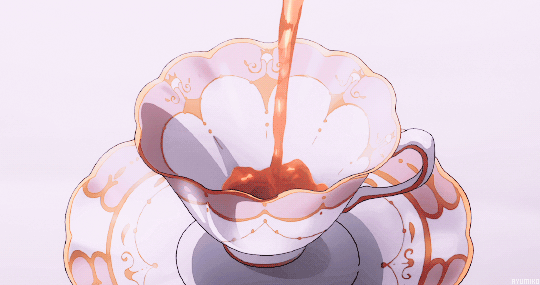
You must always smile and conceal your emotions because else, you’ll be in danger, making yourself the enemy of someone you cannot refuse. Civilians must be devoted to their Lord/nobles because they’re the ones with Mana, and without Mana, the farmers suffer. There’s no food, there’s no agriculture.
And at the beginning of the series, Rozemyne accepts this as the truth.
She sees how the amount of Mana offered correlates to the very livelihood of the commoners. Just like her, we as an audience, believe this story 100%. There’s an order to things, Nobility is inherently superior, some people just wield more power than others.
Despite this, however, Rozemyne never fully buys into this idea.
Ferdinand and the rest of the nobles say “There’s no need for commoners, they live entirely by the kindness or lack of it from the nobles”
While, on the surface, Rozemyne agrees to it (or more like, cannot find a way to counterargument), each every action since proves that she very much disagrees.
She keeps listening to commoners, keeps trying to employ the orphans, educating the kids, and forming connection with the merchants. Her instance on staying on the temple is very much a way for her to cling to her commoner origins and refusing to let go of them. And, whenever someone tries to take advantage of them, she tries her hardest to stop it by any means possible.
My favourite argument she makes, is when she explains, in Part 4 to Hartmut that:
“If we view this as nobles thinking up trendy goods and commoners making them, then nobles are the thinking mind while commoners are their hands and feet, no? Overloading commoners with unreasonable demands is no better than crippling one’s own arms and legs”.
On the surface this is an argument that appeals to nobles, seeing commoners as nothing more than another tool that must be properly utilized. However, Rozemyne is inadvertently sneaking in one of her own core views: Nobles and commoners and equals.
Rather than seeing commoners as an entirely detached object, she introduces the idea of commoners and nobility existing in an ecosystem. And here comes the first bit of proper commentary:
Hierarchies are fundamentally flawed, and what we need in a society are communities.

Rozemyne, being a chronically ill person, depends on others to do her work. To survive, we need communities and support networks. Some of the most brilliant minds and powerful players of the game do not thrive in a society that rigidly adheres to power structures such as nobility. Those so quick to toss away and dispose of whoever doesn't "fit in". Best example is Ferdiand - who was stiffled by Veronica.
This is juxtaposed with Ferdinand Hirschurl and Christine, all geniuses in their own right, extremely capable and talented. Neither of which was able to survive Ehrenfest. Even nobles of other duchies state that a single talented individual is incapable of turning the tides of their duchy.
It’s only when Rozemyne comes into the picture, forcing people around her to function as a community, as a system, that any real change is made. She’s remarkable, perhaps more than for her intellect, in her ability to raise people. Her ability to form systems and networks of highly skilled attendants what allows her to be perceived as a saint.
This is a direct contrast to her days as Urano, where she only ever submersed herself in books. I don’t doubt that Urano was as much of a genius as Rozemyne is - but her inability to connect and create a community to help her out was what caused her to be isolated. Only ever to see books and nothing more.
As Myne, she was forced to confront how vital to her survival family and community mean. As Rozemyne, she was forced to build her own, due to how nobility absolutely destroys said community in favour of a hierarchy.
And all of this, is a microcosm of Royalty.
The same attitude the nobles have to commoners is a direct 1:1 to how royals treat other nobles. They see nobles as little more than objects to be ordered around, and just like noble destroy communities and networks, royalty destroys them. Just on a much larger scale.
Rather than seeing other duchies as, you know, arms and legs to make Yurgenschmidt more powerful, capable or rich, they see them as pawns to move around to protect/save Royals themselves. As if they are Yugernschmidt.
Whenever they say “for the good of Yurgenschmidt” it’s always synonymous with the “good of Royalty”.
The duchies only exist to serve Royals, and not the other way around. They’re more than happy to cut off Ehrenfest and let it struggle, even though it’s slowly becoming the new hot spot for technological inventions in all the country. They’re essentially crippling their own body, to save themselves. And sure, in other contexts maybe it could work. Rather amputate an arm rather than lose the head. But that’s not what they’re doing. They see their “arms” as disposable. Why bother to save one, when you have another that can work as well? (Which is dumb)
This is a direct criticsm of politicians, or position in powers, that see for themselves, rather than for the greater good of a country or the collective. People who would exploit the most vulnerable in a community to keep the status quo, all while claiming it's "for the greater good".
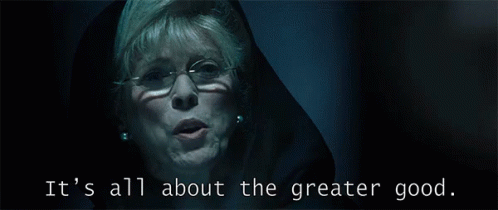
Sisgwald in particular is a great example of what Wilfred could have become if Rozemyne had no stepped in. He very much sees his wives as nothing but ways of attaining more power. He refuses to even think of other people reaching the throne and sees nothing past his own ego.
That’s why he is so taken aback by Rozemyne. Here comes a girl, with so much more experience at negotiating than him, calling him out directly over the many faults that royals are committing. As she points out, they went into a meeting expecting to extort her so completely blind they couldn’t see why Ehrenfest would be unwilling to enter negotiating.
Ferdinand explained in Part 3 how, whoever has more information in a conversation between nobles has the upper hand. This ought to be the way everyone approaches anything, but Royals very much can’t comprehend this in regards to a lesser/middle duchy. To them, all duchies are the same (much like all commoners are the same to nobles) and do not require the information. This is, to put it bluntly, idiotic to the point of impressive.
The best example? The very same meeting they had.
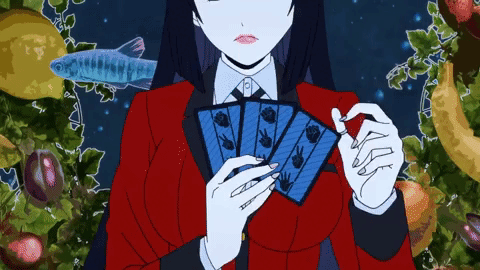
Rozemyne was able to get what she needed. Sure, the Royals also got what they wanted. But that’s it. They were able to obtain the bare minimum. While Ehrenfest was able to walk away with extensive concessions and much more room to make preparations. All while bruising the ego of Royalty.
And because they lack this ability to see nobles as a network, they also have the same problems nobles have. Their petty family drama gets dragged onto the surface for all the country to see. They're giving away information that's critical for negotiations without even noticing.
Hell, they almost exploded a war because Anastasius couldn’t tell Eglantine he liked her. Instead of raising each other up, like Rozemyne does, they drag each other own. Their lack of communication causes Rozemyne to be thrust into the middle of their family feud, trying her damnest to solve their problems, while they worry abt their own selfish desires.
But perhaps the most crucial network that they’ve lost is: Information.
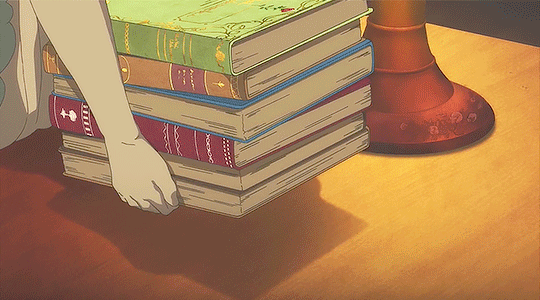
Due to the fact that Ascendance of a Bookworm is a light novel about books - it’s inevitable that we would stumble at some point with the importance of achieving information preservation. Urano herself, as a librarian, is acutely aware of how easily information is lost. Rozemyne on her hand, has had to see the direct impact this has.
The reason why the Grutrissheit is lost, is not just the war. It’s the lack of any real information preservation. And this is artificially created by the Royals themselves.
The Grutrissheit was passed by from heir to heir, but this also meant that very few people were capable of accessing the information. When war struck, those few people were killed, and the texts that remained were written in ancient languages. A language which all but few could read (Let’s put a pin on that*).
And now, we find out that Royals of the past (possibly) implemented a barrier so that no one BUT royalty could access the Grutrissheit. This makes it so that the best Zent candidate they have right now, cannot even touch it.
In an attempt to shield themselves from others, potentially, stealing what they think their “rightful” position is - they’ve blocked access to information. And now that they’re been killed NO ONE HAS ACCESS TO IT.

This is something that Rozemyne, as a librarian at heart, is desperately trying to avoid. Through her transcriptions and the rapid spread of the printing industry, she REFUSES to gatekeep information. She wants it to be accessible to anyone who wants, as long as she can get something of equal value (aka, other stories/books), and that's only to emphasize the VALUE books inherently have.
This is all to say, that the politics of AoB are quite simple if looked through these perspectives, and framing Royalty as the flawed institution it is.
It’s about how hierarchies of power are bad. The few, who have not proven their worth, have the power to deny information to a large population and deny themselves any responsibility for their actions.
Ascedance of a Bookworm initially presents you with the idea of Nobility as something rational, just to later point out all the ways it which it’s failing. The only reason why many things are working or improving in Ehrenfest is because of Sylvester and his ability to properly integrate Rozemyne’s ideas.
Ascedance of a Bookworm also states that this is not a fix that can be solved in a single action, in fact it cannot be fixed in single generation. Something that Rozemyne critiques of Sisgwals is his insistence that all problems ought to be solved quickly so they cannot cause harm in the future (again, amputating an arm to save the head).
But this is proving to be a flawed response. This idea of cutting all crippled arms is what gives way the purges, and the mana crisis they’re having.
Rozemyne, perhaps as a chronically ill child herself, does her best to avoid this. She recognizes that just because someone isn’t “up to standard”, doesn’t mean they cannot be rehabilitated and integrated back into society. She does this believing human life to be valuable regardless of what can it offer - but because of the world they live in she has hidden this behind the “so they can give back to society”.
It’s way more productive to save someone than to kill them. This creates a bunch of problems, yes. But it’s worth it. Being a leader it’s not an easy job.
It’s something even Ferdinand comments on. To be a Zent, you have to give up everything you love for your country. And that means EVERYTHING. Something that, if I’m being 100% honest, I don’t think Sisgwald understands. The mere idea of him waiting to be Zent simply because that’s what he’s been told all his life is tantamount to laughable.

At this point, the best option is undoubtedly Eglantine. If he fails to understand this and clings to a throne he’s no longer the best suited for - it’s nothing but useless pride wrapped in a cocoon of delusion.
There’s so much that needs to be learned and work to be put in. Rozemyne does not accept the role, not because she’s humble, but because she understands this. Leading takes hard work, it takes time, it takes effort. She does not want it, and why should she? She has been offered none of the privileges of royalty, yet she’s expected to perform their labour and duties.
Those who benefit from Royalty are basically dumping all their work on her lap. Well, granted, not all the work. But definitely a good chunk of theirs. For example, transcribing ancient languages to find their stupid bible, instead of asking the temple.
(*PIN: And mind you, people can absolutely still learn ancient languages. But another huge fault of the royalty, as it is right now, is that there’s no one willing to put in the time and effort to preserve or revive their own goddamn culture).
Yeah, sure, maybe Rozemyne has a duty to rule, as she’s the most capable…But. She shouldn’t. Royalty, who’s been trained their whole lives to rule, or support rulers - should be more than well-equipped to solve their own problems. Hell, they have attracted top talen- No. They’ve stolen top talent from other duchies, they have all the resources they could want, and they have the ultimate say on absolutely everything. Tell me why they want to poach another talented person from their duchy?
It’s not Rozemyne’s responsibility to solve the problems of royalty. In other words, it’s not our duty to solve politicians’ problems. It’s not our duty to solve the problem of first-world countries, it’s not our duty to solve other people’s problems.
Ugh, I’m getting heated.
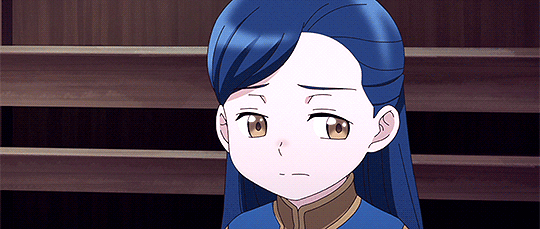
This is all, mind you, after Rozemyne was told in her early years she wouldn’t be able to achieve anything because she’s just a commoner. Which, again, bullshit. She’s the prime example that there’s nothing that prevents a commoner from being on the level of an archduke, or hell, becoming a Zent, other than a social one. Truly, Yurgenschmidt’s nobility as made-up as our own.
The introduction, or rather, the direct criticism of royalty in part 5, is the house of card toppling in all the themes touched barely in previous parts.
The issues with meritocracy, the absurd power inbalances, the outdated view of older generations that refuse to give way to a better future for the youth, as well as a hierarchy based on an entirely made-up concept.
It quickly proved to be absolutely a political story. But I find it so impressive that it’s not something you would notice, or at least be explicitly made aware, until Part 5.
Part 1 - 4 made sure to lay the ground of how this world works, then in Part 5 it decided to break the illusion that it is, in fact, working.
PREV <;< MASTERLIST >> NEXT
#ascendance of a bookworm#honzuki no gekokujou#rozemyne#essay#abolish the monarchy#no like seriously rozemyne is one bad day away from making the monarchy rethink everything
213 notes
·
View notes
Text

Buy pickaxe online at best prices | agricultural tools | Tata Agrico
Are you searching for the pickaxe online? Look no further! Explore our top-rated pickaxe manufactured by Tata Agrico, the leading agricultural tools brand.
Visit at: https://www.tataagrico.com/product-cat/pick-axe/
#agricultural tools#pick axe#top rated pickaxe#Buy pickaxe#pickaxe online at best prices#Tata Agrico#pickaxe online
0 notes
Text
Celestino Vietti, I’m one with the bike

From the Piemonte Alps to Moto2. Interview to the SKY Racing Team VR46 talent
“The most beautiful memory I have of my childhood is tied to a three wheels bike. My dad had built it for my older brother, using the engine of a grass trimmer. I used to look at my brother going around on it in the backyard, then one day I asked to try it: once I got on it I irremediably fell in love with engines. Once I got down from that first trial I immediately asked my dad to buy me a two wheels motorbike. “To have a bike without training wheels you first have to know how to ride with them”, was his answer. So I started training and at eight years old I found myself riding in my first italian championship...”
Celestino Vietti is lightness, a youthly lightness, a mature lightness, a fast lightness, cheeky to the right degree. Not yet twenty, he’s approaching his first Moto2 season, wearing the SKY Racing Team VR 46 leathers on Marco Bezzecchi’s side.

Leathers that ‘Celin’ paints with the colours of his region, Piemonte. Right in Coassolo Torinese, small settlement wedged between the Valli di Lanzo, two wheels racing had started indelibly marking his life. An atypical place, Alpi Graie, to be the natal place of a world championship level rider. A place that becomes typical as soon as you open wide the doors of the Vietti’s home.
“My uncle and my dad have always been big enthusiasts. My dad even did some uphill races when he was young. I lived all my childhood in a motorsport enviroment. My relatives had and still now have an agricultural machine repair shop that rapidly became a mandatory stop of my summers. There I used to take apart chainsaws and everything else I could find. Now I realise that the time spent in the repair shop gifted me a better feeling with the engine, with mechanics. My dad also gave me a lot of tools to read and understand the bike’s problems: thanks to him my bond with the bike got to a superior level. It’s as if I feel more merged with what I have under me, I listen to every single sound, I know how to decipher and manage it...”


A management that for this young promise of two wheels racing hasn’t been and isn’t limited to the technical side, overflowing in the character, human one. Sat in the shades of the WITHU paddock, what immediately hits you of Celestino are the lucidity in the self-analysis, the ease in communicating, in summarising the different steps he took in such a short, but already so full, life.
“To follow my dream I had to move out of my home during adolescence. The first months were so fast, everything was new, new experiences, new acquaintances. Once you settle you start thinking that once you get home from training nobody is there to wait for you. Relatives, friends, everybody is distant, everything starts getting hard. I had to grow on a personal level and, consequently, as a rider. Situations like this teach you how to manage yourself on the emotional side: sometimes I tend to get angry easily, being this much on your own helps you to reflect, to remain lucid”
Vietti’s growth was mainly through the motorsport Academy for definition, that two wheels paradise build by the tarmac’s ‘Doctor’. A restricted cenacle reserved only to those who are destined to make an art form out of racing. Disciples, students, riders waiting to see their own boundless talent explode.
“Getting into the VR46 Racing Academy was a turning point. It's important to realise your luck, the privilege you have to train every day with the best riders in the World Championship. Every time you get on track it’s an enormous challenge, there’s always somebody faster than you. I try to look at everyone, we’re many, we’re ‘colourful’, everyone has a certain characteristic to learn from: I have by my side two World Champions and then Vale, my idol, I think there’s nothing else to add...”
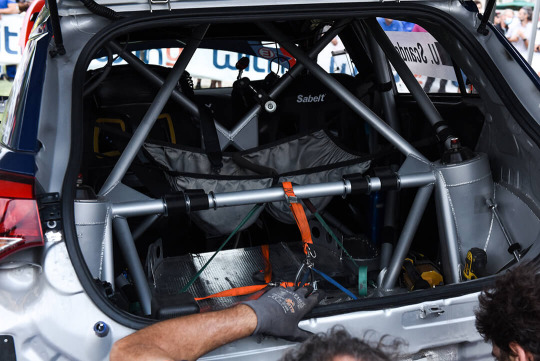

He slightly moves his hair out of the way, Celestino, when he talks about topics he’s particularly sensible about. He smiles, a sincerely emotional smile, when he gets asked what the bike means for him, for his being. A question that strikes way higher chords than the sports one.
“When you go really fast you become one with her, you find a magic harmony. Whatever she wants to do, you do it too, you become one thing. When she wants to do one thing, and you want to do another one instead, you struggle. True struggle. You can feel the separation between the two bodies. For me the bike has some sort of life of his own: it’s something difficult to explain”
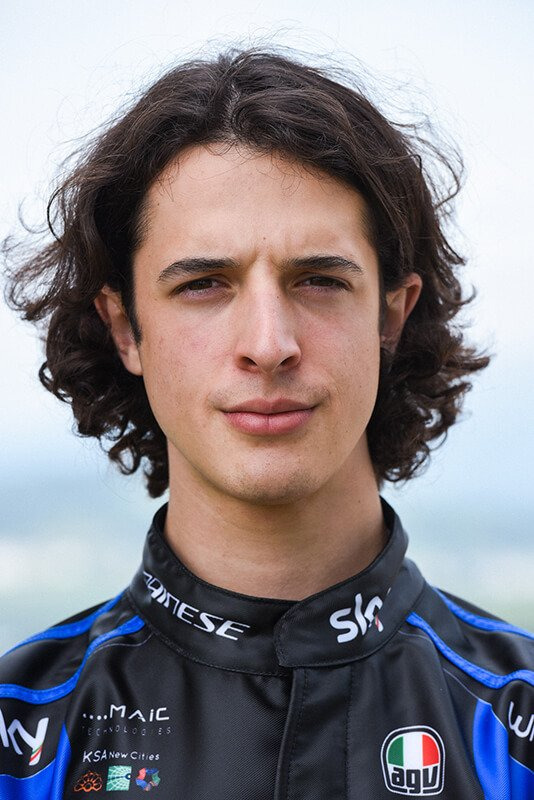
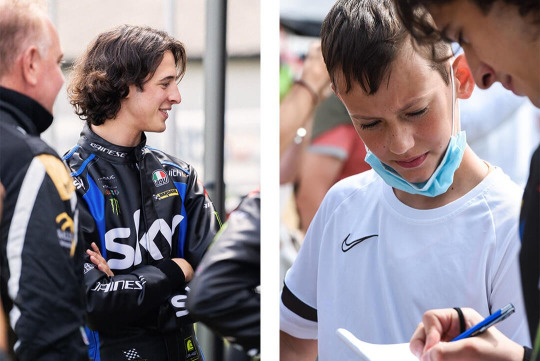

Difficult to explain, evocative to listen to. There’s dept in the words of this barely more than teenager rider of the Sky Team. On him also weight hopes and expectations of many italian fans, charmed by his results in the 2020 Moto3 season and the two first places obtained in the Styrian and France GP.
Celestino is lucid in his analysis of the big jump to Moto2, a natural jump, even though initially complex. The piemonte rider need a settling period, an adjustment phase that now appears completed, processed. To demonstrate it, an always growing confidence in placements and continuity of performances, an exponentially growing mental and sensorial presence.
“The impact with Moto2 was difficult. It’s a very particular category, unlike Moto3 it rewards constancy, precision, the bike doesn’t want to be assaulted, you can’t afford to do ‘crazy’ lap and feel satisfied. You have to curate the rhythm, you need surgical attention. Now my goal is to get as high as I can in the standings, to continue with the positive feelings of the last races and to keep building up unity with the bike. The future? Everybody’s dream is to become world champion, it’s useless beating around the bush, I’ll work hard to be able to make it”

40 notes
·
View notes
Photo

What is the Main Purpose of Land leveler
Land levelers are also one of the commonly used agriculture equipment in farming. When it is about preparing the all-new land for farming or leveling the ground after harvesting, a land leveler helps farmers make land more leveled and smooth surface obtained. It offers a cost-effective and efficient way to increase productivity.
#land leveler#buy land leveler#agricultural implement market#agriculture instruments#farming tools#farm machinery#farm implement#agriculture equipment
1 note
·
View note
Text
Meet Eloise!
The time has come - let’s introduce you to my OC!
I will not be writing a regular fic, so it might be a little bit harder to properly get to know her. But! There WILL be one shots, mostly about the most important events in her life and obviously some to describe her relationship with the love interest (😏).
Let’s start!

Eloise’s profile
Basic information:
Name: Eloise Veredi
Age: 17
Birthday: March 26th
Blood Type: A
Love Interest: Yuno Grinberryall
Birthplace: Outskirts of Clover, town of Guerdia
Magic: Glass Magic
Appearance:
Height: 165cm
Eyes: Dark green
Hair: Shoulder-length, wavy blonde hair with curtain bangs. She mostly ties it in a bun as it bothers her during training or work.
Clothing: Eloise values comfort, so her clothing generally allows a wide range of movement. As a commoner she does not own lots of fancy clothes (however she gets some when she starts working with the Magic Knights). Her favourite outfit contains a dark gray high-neck shirt, brown pants and leather knee boots. Her favourite piece of clothing is a green cape, which she received as a gift from her dad. Eloise rarely wears dresses, but with time she grows fond of them and puts them on for special occasions
Special features: With her magic being glass magic, she used to get hurt a lot while training. Currently, on her neck, arms and the right side of her abdomen are noticeable scars caused by her past lack of control over spells. Eloise’s face is partly covered with freckles, her ears are pierced - she wears small, silver earrings.
Personality:
Eloise is an introvert, however she enjoys spending time with people she knows. Due to her being a commoner she is cautious in making acquaintances as she fears being belittled by higher-ups. On the other hand, she appears confident while fulfilling her duties and doing things she’s skilled at. She prefers working on her own and is not a great team player. She may appear as reckless.
Eloise hates conflicts and is incredibly patient; however when the line is crossed, she bursts out with anger and lets all the emotion out. She has no problem with apologizing but would only do it when she actually believes she was wrong. She rarely confronts anyone, rather keeps comments to herself.
Despite not showing it so much, Eloise is emotional and quickly grows fond of people (the hardest part is actually meeting them). She finds it difficult to let go of things important to her and holds grudges when she gets hurt.
She tends to overthink and assume other peoples’ intentions. She is quick in judgement, but when proven otherwise she eventually changes her opinion.
Background:
Eloise is a daughter of Delano and Ann Veredi, known craftsmen. Her parents and her grandfather, Gerald, ran a business based on agricultural tools trading. As a child she would travel with them around Clover to find new clients and sell merchandise. One of the places they visited regularly was the Hage village, where Eloise met Asta and Yuno. She quickly befriended Asta, and played with him a lot. Her relationship with Yuno was not well developed, as the boy was too shy and guarded; therefore she did not know much about him. After her grandpa’s death, Delano came up with improving their products with magic. At this point regular citizens couldn’t afford to buy them, so the family started visiting the capital and wealthier towns. Eloise lost contact with Asta and Yuno completely. During one of her stays in the capital, she happened to see a Captain scolding an injured Magic Knight. Not so much later she heard an older mage bullying a squadmate for his status. At that moment, Eloise decided not to take part in the entrance exam.
When she was 13, she wanted to focus on her magic and stopped travelling with her parents. She would spend hours in the forest, trying to learn how to control the only spell she knew how to cast - The Glass Daggers. Due to her lack of control, Eloise would often get injured and come home with ripped clothes, and wounds that left visible marks on her body. Through the years she had encountered many strange creatures and step by step learned how to tackle them. At some point she became and expert and would take care of magically influenced animals and plants around the town.
Eloise never had close friends. She got on well with her classmates, but never considered them that important in her life. Her lack of closeness with people her age did not bother her, she knew how to entertain herself on her own and maintained good relationships with older and younger members of her community.
One shots background:
One day, when Eloise was figting magic boars in the forest, she suddenly got shot down. She found out that the Golden Dawns' knoghts arrived to take care of the problem on their own. When told to go home, she showed them her method for dealing with these animals. Mimosa, in awe of the girls knowledge, suggested taking her to the capital and introducing her to the Wizard King. He proposed that Eloise stays in the capital and teaches the Magic Knights her methods. (That's where the one shots start!)
Fun facts:
She has a habit of speaking too loud
She would often talk to herself
Her parents like to call her ”Apple pie”
She gets easily attached to objects
She loves teasing
At some point Eloise finds out, that with her glass magic she can cast a reverse spell and fight with sand
When asked about her scars, she jokes that she fell out of a window
Eloise does not know how to properly fly a broom, as she never really travelled outside of her town
She loves cooking but only knows how to prepare basic meals
She easily gets bored
#Firstpost#oc#original character#oc art#artists on tumblr#black clover#bc#yuno#asta black clover#asta#magicknights#oc profile
42 notes
·
View notes
Text
Update post:
In Hezbollah's rocket attack on Israel's north today, one person was killed and at least 9 are injured. All are from Thailand. I got to guide groups of students from Thailand, who come to study agriculture in Israel, and as part of their degree, they also work in the fields. They were so lovely, and they absolutely don't deserve this, for having tried to better their lives and the lives of those around them. Which is making me think of this vid from Oct 7 that I just can't forget of a Thai man, who was murdered by Hamas terrorists, footage I will never forget for as long as I live. You could argue that Hezbollah's rockets didn't mean to target Thai nationals, but the terrorists on Oct 7 KNEW that they were torturing (they took their time sadistically toying around with the man in the vid) and murdering non-Israelis. They KNEW they were kidnapping non-Israelis. And they still did it. Remind me, which part of Palestine is Thailand supposedly occupying?
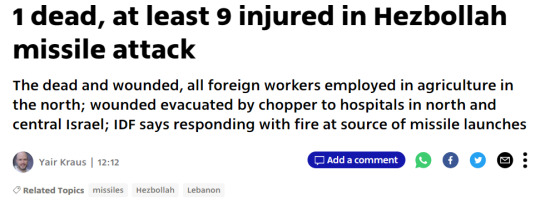
On Thursday, in an independent shooting terrorist attack in Eli, two Israelis were murdered. They have been identified as 16 years old Uriah Hartom, and 57 years old father of three Yitzchak Zeiger. The Palestinian terrorist was identified as a Palestinian police officer, affiliated with Fatah (the party which currently rules the Palestinian Authority), not Hamas. He had previously been imprisoned by Israel twice, for dealing in illegal arms. The owner of a hummus diner, located near the gas station where the terrorist attack took place, was by chance on a break from his reserves service in Gaza. He heard the shots, came out, fired loosely at the terrorist to attract him away from civilians, went back inside, took a better shooting position, and finished the terrorist off.

A 57 years old man from the Israeli city of Ashkelon was stabbed during an independet terrorist attack in the area of Hebron on Saturday. The terrorist has been arrested.
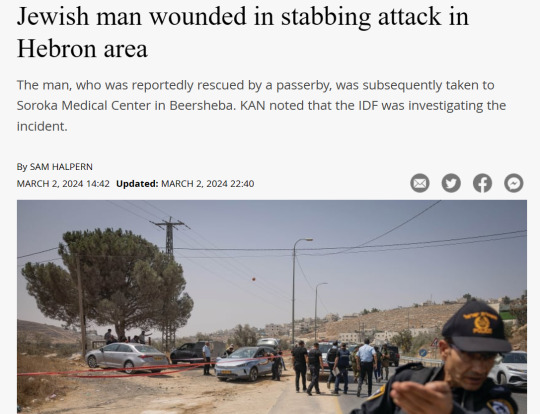
Globally, we continue to see a rise in antisemitic incidents, including violent ones. Over the course of the past few days alone, we got an attack in Switzerland (in Zurich, where a Jewish man was stabbed on Saturday eve. The 15 years old terrorist was arrested by Swiss police. Please remember this for the next time you see Israel being vilified for arresting teenage terrorists), an attack on a Jewish man exiting a synagogue in Paris, France on Friday eve (Israeli TV reports that the terrorist called the victim, "a dirty Jew") and a Muslim former patient who shot his Jewish dentist to death, not too far from San Diego in the US (yeah, sorry. I don't buy that the moment a supposedly disgruntled ex patient decides to kill his Jewish doctor just so happens to be a moment when anti-Jewish violence is being justified, normalized and rising everywhere. A part of how antisrmitism, homophobia, racism and other forms of generalized hatred work, is that even when grudges are personal, these forms of hate give the hater socially acceptable terms and tools to openly hurt the person they hate, more than they would have dared to if they had a grudge against someone who wasn't a member of a marginalized group. Apparenntly, I'm not the only one who thinks the antisemitic angle mustn't be left out).

Meanwhile, Israel has arrested the members of a terrorist squad in Hebron, which was inspired by ISIS. They had already managed to produce 100 explosive devices, and we can only imagine how many lives have been saved thanks to these arrests.

This is 33 years old Dennis Yakimov.
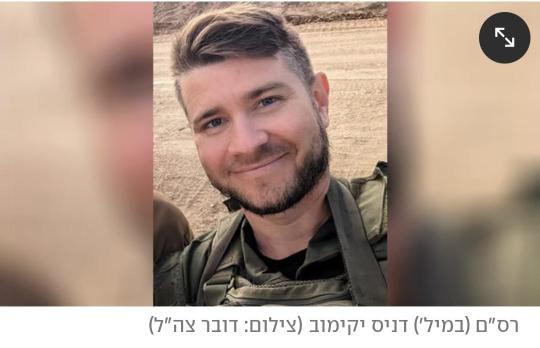
He was killed the other day during the fighting in Gaza. Every day, Israeli soldiers are dying there, and Israelis watch the news, and hear their family members mourn them, and cry over the loss. IDK if any words I write here can express the grief, so today I'm just going to share this short vid of Dennis' only daughter, Danelina, speaking at his funeral:
IDK how people can actually think that after the loss, pain and horror of Oct 7, Israelis are putting themselves through this added loss, pain and horror just to see more Palestinians killed. And that's what they mean, every time they ask, "How many Palestinians have to die..." as if the goal was ever dead Palestinians, rather than Hamas being destroyed and Israelis knowing that Hamas could never perpetrate another massacre as it did, also aiming to deter other terrorist organizations such as Hezbollah from trying such a massacre, knowing that if they did, Israel wouldn't relent before they're destroyed, too. I think this kind of question can only be asked by people, for whom we're not really human beings, and the devastating pain that we feel over our fallen and their loved ones, who will never be the same, really doesn't register.
May Dennis' memory be a blessing.
(for all of my updates and ask replies regarding Israel, click here)
#israel#antisemitism#israeli#israel news#israel under attack#israel under fire#terrorism#anti terrorism#hamas#antisemitic#antisemites#jews#jew#judaism#jumblr#frumblr#jewish
98 notes
·
View notes